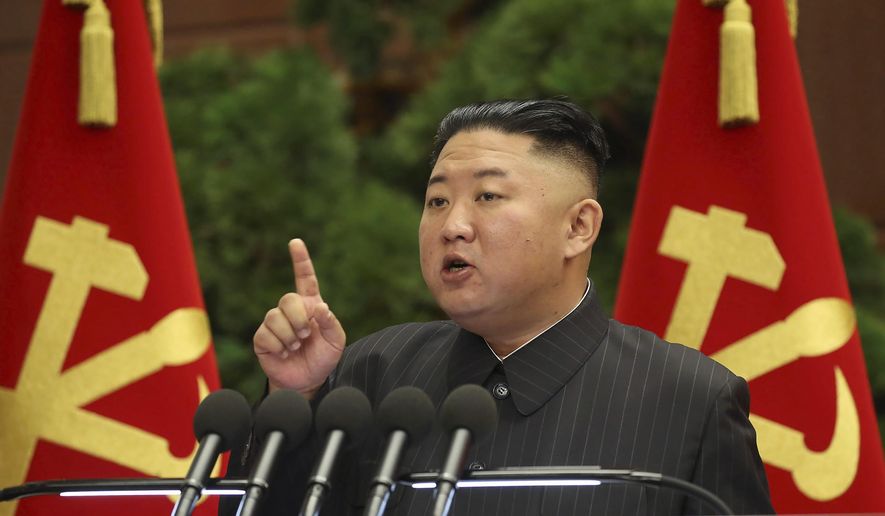U.S.-South Korea annual military drills became a political football during the Trump administration, scaled back as President Trump pursued an elusive nuclear deal with North Korean leader Kim Jong-un.
The first annual joint exercises of the Biden administration involving U.S. and South Korean troops are set to kick off next month, and Pyongyang isn’t happy about it.
With direct U.S.-North Korean diplomacy in a deep freeze since Mr. Biden took office, the North this week complained bitterly about the planned exercises dubbed Dong Maeng, the Korean word for “alliance.” A leading propaganda site for Mr. Kim’s regime slammed Seoul for agreeing to go ahead with the drills.
“It clearly shows the nefarious scheme of the fanatics that are pushing ahead with their war to invade the North and fight their own people,” according to the North Korean propaganda website, Uriminzokkiri.
Pyongyang has long branded the joint U.S.-South Korea maneuvers a rehearsal for invasion.
But U.S. commanders worried that Mr. Trump’s decision to scale back the annual exercises was cutting into the ability of Washington and Seoul to deter the nuclear-armed North, at a time when the two Koreas remain technically at war. The U.S. and South Korea have traditionally staged major joint exercises in March and August, with smaller drills scheduled throughout the year.
“We’re going to continue to remain committed to readiness and appropriate capabilities on the peninsula because we have such a serious commitment to our [South Korean] allies,” Pentagon spokesman John Kirby told reporters this week. “All military operations and exercises that we conduct on the peninsula, we do it in consultation and close coordination with our [South Korean] allies.”
Some members of South Korea’s ruling Democratic Party have recently urged that this year’s exercise, which will solely be a computerized command post drill, also be curtailed as an olive branch to Pyongyang. But David Maxwell, an analyst at the Foundation for Defense of Democracies think tank, said that would be precisely the wrong response.
“Many in Korea, some within the administration [of President Moon Jae-in], think that if we appease them, it would be good for North-South negotiations and bring them back to the table,” said Mr. Maxwell, a retired Army Green Beret colonel with extensive experience in Asia. “It’s flat out wrong and it would be dangerous if we were to do that.”
The fact that next month’s Dong Maeng exercise will be a command post operation not involving units maneuvering in the field is not a sign it has been cut back in importance, Mr. Maxwell said. It will be the first major opportunity for Gen. Paul J. LaCamera, the new commander of U.S. Forces in Korea and the joint [U.S.-South Korean command], to plan how to defend against an invasion from the north.
“It allows him to not only learn the defense plan but to see the command and components in full operation,” Mr. Maxwell said. “He is able to assess the status of the combined command.”
In addition to the August command post exercise, both nations usually stage field maneuvers in March. It was canceled in March over COVID-19 concerns, a decision that Mr. Maxwell criticizes.
“COVID is like a biological attack. The commands have to be able to fight through a biological attack,” he said. “If we overreact and are too timid because of COVID, [North Korea] might get the idea that a biological attack would be effective.”
Although some civic groups in Seoul have called for the military drills to be canceled, military officials in Seoul and Washington say such combined exercises are necessary to military readiness on the peninsula. The area is so critical that the Navy admiral in charge of America’s nuclear arsenal visited the country only weeks before the maneuvers are expected to kick off.
Adm. Charles Richard, commander of U.S. Strategic Command, met with both U.S. and Korean commanders to discuss the deterrence posture and support the nation’s ROK allies on the Korean Peninsula.
“The strategic environment is rapidly changing. Deterrence in the 21st century has to involve our allies and partners,” Adm. Richard said. “It requires close cooperation, integration and an understanding of the differing perspectives on certain issues.”
North Korea often stages its own military maneuvers at the same time. Military officials in Seoul said they are monitoring the situation while maintaining close coordination with U.S. forces.
“Currently, there is nothing to say regarding the issue,” Korean military spokesman Col. Kim Jun-rak told the Yonhap news agency. “We are closely checking movements by the North’s military.”
As the military preparations proceed, Deputy Secretary of State Wendy Sherman was visiting Seoul on Thursday as a part of a tour of Asian nations, including a weekend visit planned for China. The Associated Press reported that Ms. Sherman and South Korean Foreign Minister Chung Eui-yong agreed on the need to press North Korea to return to the bargaining table over its nuclear and ballistic missile programs.
Top North Korean officials have adamantly refused so far to begin new talks with the U.S. since Mr. Biden’s election.
• Mike Glenn can be reached at mglenn@washingtontimes.com.




Please read our comment policy before commenting.